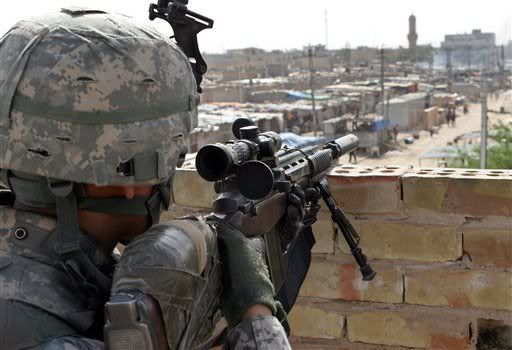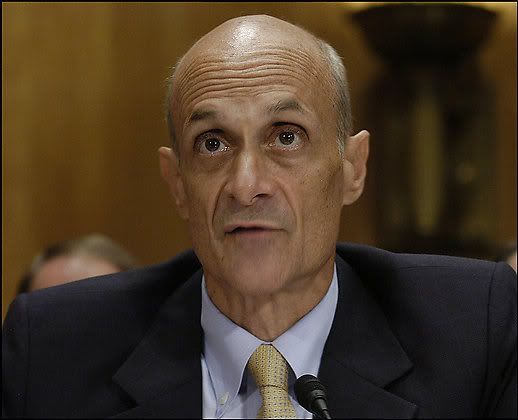
Daniel Ellsberg, the former Defense Department analyst who leaked the secret Pentagon Papers history of the Vietnam War, offered insights into the looming war with Iran and the loss of liberty in the United States at an American University symposium on Sept. 20.
Daniel Ellsberg, the former Defense Department analyst who leaked the secret Pentagon Papers history of the Vietnam War, offered insights into the looming war with Iran and the loss of liberty in the United States at an American University symposium on Sept. 20.
The following is an edited transcript of Ellsberg’s speech, courtesy of ConsortiumNews.com:
I think nothing has higher priority than averting an attack on Iran, which I think will be accompanied by a further change in our way of governing here that in effect will convert us into what I would call a police state.
If there’s another 9/11 under this regime … it means that they switch on full extent all the apparatus of a police state that has been patiently constructed, largely secretly at first but eventually leaked out and known and accepted by the Democratic people in Congress, by the Republicans and so forth.
Will there be anything left for NSA to increase its surveillance of us? … They may be to the limit of their technical capability now, or they may not. But if they’re not now they will be after another 9/11.
And I would say after the Iranian retaliation to an American attack on Iran, you will then see an increased attack on Iran – an escalation – which will be also accompanied by a total suppression of dissent in this country, including detention camps.
It’s a little hard for me to distinguish the two contingencies; they could come together. Another 9/11 or an Iranian attack in which Iran’s reaction against Israel, against our shipping, against our troops in Iraq above all, possibly in this country, will justify the full panoply of measures that have been prepared now, legitimized, and to some extent written into law.
This is an unusual gang, even for Republicans. [But] I think that the successors to this regime are not likely to roll back the assault on the Constitution. They will take advantage of it, they will exploit it.
Will Hillary Clinton as president decide to turn off NSA after the last five years of illegal surveillance? Will she deprive her administration her ability to protect United States citizens from possible terrorism by blinding herself and deafening herself to all that NSA can provide? I don’t think so.
Unless this somehow, by a change in our political climate, of a radical change, unless this gets rolled back in the next year or two before a new administration comes in – and there’s no move to do this at this point – unless that happens I don’t see it happening under the next administration, whether Republican or Democratic.
The Next Coup
Let me simplify this and not just to be rhetorical: A coup has occurred. I woke up the other day realizing, coming out of sleep, that a coup has occurred. It’s not just a question that a coup lies ahead with the next 9/11. That’s the next coup, that completes the first.
The last five years have seen a steady assault on every fundamental of our Constitution, … what the rest of the world looked at for the last 200 years as a model and experiment to the rest of the world – in checks and balances, limited government, Bill of Rights, individual rights protected from majority infringement by the Congress, an independent judiciary, the possibility of impeachment.
There have been violations of these principles by many presidents before. Most of the specific things that Bush has done in the way of illegal surveillance and other matters were done under my boss Lyndon Johnson in the Vietnam War: the use of CIA, FBI, NSA against Americans.
I could go through a list going back before this century to Lincoln’s suspension of habeas corpus in the Civil War, and before that the Alien and Sedition Acts in the 18th century. I think that none of those presidents were in fact what I would call quite precisely the current administration: domestic enemies of the Constitution.
I think that none of these presidents with all their violations, which were impeachable had they been found out at the time and in nearly every case their violations were not found out until they were out of office so we didn’t have the exact challenge that we have today.
That was true with the first term of Nixon and certainly of Johnson, Kennedy and others. They were impeachable, they weren’t found out in time, but I think it was not their intention to in the crisis situations that they felt justified their actions, to change our form of government.
It is increasingly clear with each new book and each new leak that comes out, that Richard Cheney and his now chief of staff David Addington have had precisely that in mind since at least the early 70s. Not just since 1992, not since 2001, but have believed in Executive government, single-branch government under an Executive president – elected or not – with unrestrained powers. They did not believe in restraint.
When I say this I’m not saying they are traitors. I don’t think they have in mind allegiance to some foreign power or have a desire to help a foreign power. I believe they have in their own minds a love of this country and what they think is best for this country – but what they think is best is directly and consciously at odds with what the Founders of this country and Constitution thought.
They believe we need a different kind of government now, an Executive government essentially, rule by decree, which is what we’re getting with signing statements. Signing statements are talked about as line-item vetoes which is one [way] of describing them which are unconstitutional in themselves, but in other ways are just saying the president says “I decide what I enforce. I decide what the law is. I legislate.”
It’s [the same] with the military commissions, courts that are under the entire control of the Executive Branch, essentially of the president. A concentration of legislative, judicial, and executive powers in one branch, which is precisely what the Founders meant to avert, and tried to avert and did avert to the best of their ability in the Constitution.
Founders Had It Right
Now I’m appealing to that as a crisis right now not just because it is a break in tradition but because I believe in my heart and from my experience that on this point the Founders had it right.
It’s not just “our way of doing things” – it was a crucial perception on the corruption of power to anybody including Americans. On procedures and institutions that might possibly keep that power under control because the alternative was what we have just seen, wars like Vietnam, wars like Iraq, wars like the one coming.
That brings me to the second point. This Executive Branch, under specifically Bush and Cheney, despite opposition from most of the rest of the branch, even of the cabinet, clearly intends a war against Iran which even by imperialist standards, standards in other words which were accepted not only by nearly everyone in the Executive Branch but most of the leaders in Congress. The interests of the empire, the need for hegemony, our right to control and our need to control the oil of the Middle East and many other places. That is consensual in our establishment. …
But even by those standards, an attack on Iran is insane. And I say that quietly, I don’t mean it to be heard as rhetoric. Of course it’s not only aggression and a violation of international law, a supreme international crime, but it is by imperial standards, insane in terms of the consequences.
Does that make it impossible? No, it obviously doesn’t, it doesn’t even make it unlikely.
That is because two things come together that with the acceptance for various reasons of the Congress – Democrats and Republicans – and the public and the media, we have freed the White House – the president and the vice president – from virtually any restraint by Congress, courts, media, public, whatever.
And on the other hand, the people who have this unrestrained power are crazy. Not entirely, but they have crazy beliefs.
And the question is what then, what can we do about this? We are heading towards an insane operation. It is not certain. It is likely. … I want to try to be realistic myself here, to encourage us to do what we must do, what is needed to be done with the full recognition of the reality. Nothing is impossible.
What I’m talking about in the way of a police state, in the way of an attack on Iran is not certain. Nothing is certain, actually. However, I think it is probable, more likely than not, that in the next 15, 16 months of this administration we will see an attack on Iran. Probably. Whatever we do.
And … we will not succeed in moving Congress probably, and Congress probably will not stop the president from doing this. And that’s where we’re heading. That’s a very ugly, ugly prospect.
However, I think it’s up to us to work to increase that small perhaps – anyway not large – possibility and probability to avert this within the next 15 months, aside from the effort that we have to make for the rest of our lives.
Restoring the Republic
Getting back the constitutional government and improving it will take a long time. And I think if we don’t get started now, it won’t be started under the next administration.
Getting out of Iraq will take a long time. Averting Iran and averting a further coup in the face of a 9/11, another attack, is for right now, it can’t be put off. It will take a kind of political and moral courage of which we have seen very little…
We have a really unusual concentration here and in this audience, of people who have in fact changed their lives, changed their position, lost their friends to a large extent, risked and experienced being called terrible names, “traitor,” “weak on terrorism” – names that politicians will do anything to avoid being called.
How do we get more people in the government and in the public at large to change their lives now in a crisis in a critical way? How do we get Nancy Pelosi and Harry Reid for example? What kinds of pressures, what kinds of influences can be brought to bear to get Congress to do their jobs? It isn’t just doing their jobs. Getting them to obey their oaths of office.
I took an oath many times, an oath of office as a Marine lieutenant, as an official in the Defense Department, as an official in the State Department as a Foreign Service officer. A number of times I took an oath of office which is the same oath office taken by every member of Congress and every official in the United States and every officer in the United States armed services.
And that oath is not to a Commander in Chief, which is not mentioned. It is not to a fuehrer. It is not even to superior officers. The oath is precisely to protect and uphold the Constitution of the United States.
Now that is an oath I violated every day for years in the Defense Department without realizing it when I kept my mouth shut when I knew the public was being lied into a war as they were lied into Iraq, as they are being lied into war in Iran.
I knew that I had the documents that proved it, and I did not put it out then. I was not obeying my oath which I eventually came to do.
I’ve often said that Lt. Ehren Watada – who still faces trial for refusing to obey orders to deploy to Iraq which he correctly perceives to be an unconstitutional and aggressive war – is the single officer in the United States armed services who is taking seriously in upholding his oath.
The president is clearly violating that oath, of course. Everybody under him who understands what is going on and there are myriad, are violating their oaths. And that’s the standard that I think we should be asking of people.
Congressional Courage
On the Democratic side, on the political side, I think we should be demanding of our Democratic leaders in the House and Senate – and frankly of the Republicans – that it is not their highest single absolute priority to be reelected or to maintain a Democratic majority so that Pelosi can still be Speaker of the House and Reid can be in the Senate, or to increase that majority.
I’m not going to say that for politicians they should ignore that, or that they should do something else entirely, or that they should not worry about that.
Of course that will be and should be a major concern of theirs, but they’re acting like it’s their sole concern. Which is business as usual. “We have a majority, let’s not lose it, let’s keep it. Let’s keep those chairmanships.” Exactly what have those chairmanships done for us to save the Constitution in the last couple of years?
I am shocked by the Republicans today that I read in the Washington Post who yesterday threatened a filibuster if we … get back habeas corpus. The ruling out of habeas corpus with the help of the Democrats did not get us back to George the First it got us back to before King John 700 years ago in terms of counter-revolution.
We need some way, and Ann Wright has one way, of sitting in, in Conyers office and getting arrested. Ray McGovern has been getting arrested, pushed out the other day for saying the simple words “swear him in” when it came to testimony.
I think we’ve got to somehow get home to them [in Congress] that this is the time for them to uphold the oath, to preserve the Constitution, which is worth struggling for in part because it’s only with the power that the Constitution gives Congress responding to the public, only with that can we protect the world from mad men in power in the White House who intend an attack on Iran.
And the current generation of American generals and others who realize that this will be a catastrophe have not shown themselves – they might be people who in their past lives risked their bodies and their lives in Vietnam or elsewhere, like [Colin] Powell, and would not risk their career or their relation with the president to the slightest degree.
That has to change. And it’s the example of people like those up here who somehow brought home to our representatives that they as humans and as citizens have the power to do likewise and find in themselves the courage to protect this country and protect the world. Thank you.

















